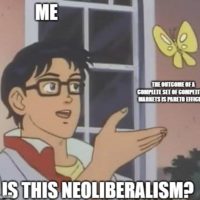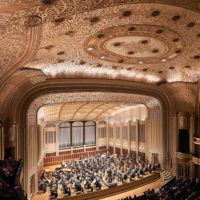US cinema chain AMC has announced it will start to have differential prices for movie seating: Three pricing tiers will soon be offered. For example, the highest-end “Preferred” tier are in the middle of the theaters and will be priced at a “slight premium” compared to its “Standard” tier, which the theater chains says will remain the most common choice and will be sold for the “traditional cost of a ticket.” The third tier is called “Value,” which are seats in the front row of theaters and will cost less than than its “Standard” … [Read more...]
Book Diary – June 7 – New Working Paper on the Economics of Arts Funding – Updated June 9 with a good question
Still a work in progress, but a draft essay summarizing the economic approach to public funding for the arts is available here for (free) download. Public goods and externalities, there's no disputing tastes, or maybe there is, nudges, merit goods, Leonard Bast, The Children of Men, contingent valuation, and an attempt to define neoliberalism. I finish by citing this most highly recommended essay: David Throsby (2003) gets to the heart of the issue: there might be “cultural value” in the arts, “their aesthetic properties, their … [Read more...]
Book Diary – May 23 – What is Equity in the Arts? A First Look…
There are two ways to approach equity, which I'm going to define as a fair or just set of entitlements or outcomes among people, not necessarily equal, but fair. One way is to focus on people's disposable income: what are people able to buy for themselves? How they spend their money is not the primary concern. If you and I have equal disposable income, and face the same prices when we shop, what does it matter if you spend more on rent and less on going out than I do, if we each have the same options? There are some economists, typically … [Read more...]
Book Diary – May 19 – Desires about desires, nudges, merit goods again, duties and commitments
My previous post was here. A lot of writing today, so this entry a bit longer and in the weeds than usual... In economic analysis, of arts funding or anything else, people's preferences are assumed to be “rational”, which here has the narrow definition of consistency (If I prefer the blue tie to the red tie, and prefer the red tie to the green tie, rationality means I must therefore prefer the blue tie to the green tie, but not much else), and does not question the ends for what the consumer buys. Economics also works on the assumption that … [Read more...]
Book Diary – May 13 – Can a Neoliberal support public funding for the arts? – Updated
In the field of cultural affairs I often come across papers that use the word "neoliberalism", virtually always describing a bad thing, but with its precise meaning pretty vague - even when I ask as a friendly question what the presenters mean they are not quite sure. In arts policy, it is often applied to criticism of cuts in funding, though neoliberalism doesn't seem to apply to all cuts in public budgets - you don't typically see someone calling for cuts to the defense budget referred to as neoliberal. So here I'm going to take a stab at … [Read more...]
Book Diary – May 9 – How did I get here? Some biography, Econ 101ism…
I am writing a book about The Moral Foundations of Public Funding for the Arts. My first diary entries are here and here. How did I come to be writing on this topic? Let's go way back... In high school I was one of the band room kids: French horn in band, bass in jazz band, chamber choir, musical theatre, rock and roll on the side, and the minimal amount of academic subjects I could get away with. My music teacher, Mr Burritt, remains the most influential teacher in my life. And with that, I applied to the university music school, in the … [Read more...]
Book Diary – April 27 – Arts Funding and Welfarism, Merit Goods, Who Cares if you Listen?, and a first look at Perfectionism…
'I think there can't be too many pictures and statues and works of art,' Hyacinth broke out. 'The more the better, whether people are hungry or not.' Henry James, The Princess Casamassima This week (and the next few weeks) I have been wrestling with the topic of perfectionism in moral theory. It has very important implications for how one might justify public funding for the arts, and might deal a heavy blow against such funding. Let's start with how economists look at the world (yes, typical of an economist to do this). When … [Read more...]
Book Diary – April 22
I am writing a book, on the "moral foundations of public funding for the arts". It will eventually appear in the series New Directions in Cultural Policy Research, hopefully some time in 2023. But first I have to write it. This diary will chart my progress through the year, and I will always welcome your comments and suggestions. So what is it about? Take as an example a major American orchestra. Each year, it might get $40,000 or so from the National Endowment for the Arts, around $500,000 from its state arts council, and perhaps … [Read more...]
The WPA is history
New York City has announced a new (well, sort of) arts program. Hyperallergic reports: The City of New York will put some artists to work this summer with a $25 million program inspired by the New Deal’s Works Progress Administration (WPA). Announced yesterday, May 6, the recovery program will pay hundreds of local artists to beautify and activate public spaces across the city with murals, public artworks, performances, and more.The new program, called City Artist Corps, is expected to create jobs for more than 1,500 artists in NYC, a … [Read more...]
It’s Friday, Ask Me Anything
The amazing students in our Arts Administration program at the O'Neill School at Indiana University have requested an ask-me-anything day, and so here it is. Through the day you can continue to ask questions either in the comments section here, or on Twitter, and I'll do my best. 2:30 pm What is the most valuable lesson you've learned as a parent? I'll give a list: Be as good as you can, know you will never be perfect; let children explore; recognize when you have done wrong, apologize for it, but don't dwell on it, look forward and be … [Read more...]










